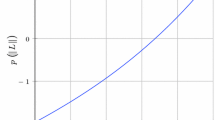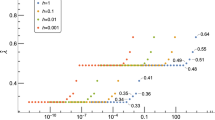Abstract
In this paper we consider Strong Stability Preserving (SSP) properties for explicit Runge–Kutta (RK) methods applied to a class of nonlinear ordinary differential equations. We define new modified threshold factors that allow us to prove properties, provided that they hold for explicit Euler steps. For many methods, the stepsize restrictions obtained are sharper than the ones obtained in terms of the Kraaijevanger’s coefficient in the SSP theory. In particular, for the classical 4-stage fourth order method we get nontrivial stepsize restrictions. Furthermore, the order barrier \(p\le 4\) for explicit SSP RK methods is not obtained. An open question is the existence of explicit RK schemes with order \(p\ge 5\) and nontrivial modified threshold factor. The numerical experiments done illustrate the results obtained.
Similar content being viewed by others
References
Acosta, G., Durán, R.G., Rossi, J.D.: An adaptive time step procedure for a parabolic problem with blow-up. Computing 68(4), 343–373 (2002)
Dekker, K., Verwer, J.G.: Stability of Runge–Kutta methods for stiff nonlinear differential equations. CWI Monographs, North-Holland, Amsterdam (1984)
Ferracina, L., Spijker, M.N.: Stepsize restrictions for the total-variation-diminishing property in general Runge–Kutta methods. SIAM J. Numer. Anal. 42(3), 1073–1093 (2004)
Ferracina, L., Spijker, M.N.: An extension and analysis of the Shu-Osher representation of Runge–Kutta methods. Math. Comput. 74, 201–219 (2005)
Gottlieb, S., Ketcheson, D.I., Shu, C.W.: High order strong stability preserving time discretizations. J. Sci. Comput. 38(3), 251–289 (2009)
Gottlieb, S., Shu, C.W.: Total variation diminishing Runge–Kutta schemes. Math. Comput. 67, 73–85 (1998)
Higueras, I.: Representations of Runge–Kutta methods and strong stability preserving methods. SIAM J. Numer. Anal. 43(3), 924–948 (2005)
Higueras, I.: Strong stability for additive Runge–Kutta methods. SIAM J. Numer. Anal. 44(4), 1735–1758 (2006)
Horváth, Z.: Positivity of Runge–Kutta and diagonally split Runge–Kutta methods. Appl. Numer. Math. 28(2–4), 309–326 (1998)
Horváth, Z.: On the positivity step size threshold of Runge–Kutta methods. Appl. Numer. Math. 53(2–4), 341–356 (2005)
Hundsdorfer, W., Spijker, M.N.: Boundedness and strong stability of Runge–Kutta methods. Math. Comput. 80(274), 863–886 (2011)
Hundsdorfer, W., Koren, B., van Loon, M., Verwer, J.C.: A positive finite-difference advection scheme. J. Comput. Phys. 117(1), 35–46 (1995)
Ketcheson, D.I., Macdonald, C.B., Gottlieb, S.: Optimal implicit strong stability preserving Runge–Kutta methods. Appl. Numer. Math. 59(2), 373–392 (2009)
Ketcheson, D.I.: Highly efficient strong stability preserving Runge–Kutta methods with low-storage implementations. SIAM J. Sci. Comput. 30(4), 2113–2136 (2008)
Kraaijevanger, J.F.B.M.: Absolute monotonicity of polynomials occurring in the numerical solution of initial value problems. Numer. Math. 48(3), 303–322 (1986)
Kraaijevanger, J.F.B.M.: Contractivity of Runge–Kutta methods. BIT 31(3), 482–528 (1991)
Mehdizadeh Khalsaraei, M.: An improvement on the positivity results for 2-stage explicit Runge–Kutta methods. J. Comput. Appl. Math. 235, 137–143 (2010)
Ruuth, S.J., Spiteri, R.J.: Two barriers on strong-stability-preserving time discretization methods. J. Sci. Comput. 17(1), 211–220 (2002)
Ruuth, S.J.: Global optimization of explicit strong-stability-preserving Runge–Kutta methods. Math. Comput. 75(253), 183–208 (2006)
Shu, C.W.: Total-variation-diminishing time discretizations. SIAM J. Sci. Comput. 9(6), 1073–1084 (1988)
Shu, C.W., Osher, S.: Efficient implementation of essentially non-oscillatory shock-capturing schemes. J. Comput. Phys. 77(2), 439–471 (1988)
Spijker, M.N.: Contractivity in the numerical solution of initial value problems. Numer. Math. 42(3), 271–290 (1983)
Spijker, M.N.: Stepsize restrictions for stability of one-step methods in the numerical solution of initial value problems. Math. Comput. 45(172), 377–392 (1985)
Spijker, M.N.: Stepsize conditions for general monotonicity in numerical initial value problems. SIAM J. Numer. Anal. 45(3), 1226–1245 (2008)
Spiteri, R.J., Ruuth, S.J.: A new class of optimal high-order strong-stability-preserving time discretization methods. SIAM J. Numer. Anal. 40(2), 469–491 (2002)
Spiteri, R.J., Ruuth, S.J.: Non-linear evolution using optimal fourth-order strong-stability-preserving Runge–Kutta methods. Math. Comput. Simul. 62(1–2), 125–135 (2003)
Wang, R., Spiteri, R.J.: Linear instability of the fifth-order WENO method. SIAM J. Numer. Anal. 45(5), 1871–1901 (2007)
Acknowledgments
The author is thankful to the anonymous referees for the comments and remarks on the paper.
Author information
Authors and Affiliations
Corresponding author
Additional information
Research supported by the Ministerio de Ciencia y Tecnología, Project MTM2011-23203.
Appendix
Appendix
In this section we give the coefficients of several explicit methods from the literature used in the numerical experiments.
Methods (6.2-b) and (6.3-b) are the optimal \(s\) stage order \(s\) explicit RK methods with \(\mathcal{R}(\mathbb A )=1\). Methods (6.2a, b) and (6.3a, b) have been used in [12] in the context of positivity; methods (6.2c, d) and (6.3c, d) have been used in [27].
-
First order method:
$$\begin{aligned} \begin{array}{c|cc} 0 &{} 0 &{} \\ \frac{3}{4} &{} \frac{3}{4} &{} 0 \\ \hline &{} 0 &{} 1 \end{array} \end{aligned}$$(6.1) -
Second order methods:
$$\begin{aligned} \begin{array}{ll} \text{(a) } \quad \quad \begin{array}{c|cc} 0 &{} 0 &{} \\ \frac{1}{2} &{} \frac{1}{2} &{} 0 \\ \hline &{} 0 &{} 1 \end{array} &{} \text{(b) } \quad \quad \begin{array}{c|cc} 0 &{} 0 &{} \\ 1 &{} 1 &{} 0 \\ \hline &{} \frac{1}{2} &{} \frac{1}{2}\\ \end{array}\\ \text{(c) } \quad \quad \begin{array}{c|ccc} 0 &{} 0 &{} &{}\\ \frac{1}{3} &{} \frac{1}{3} &{} 0 &{} \\ 1 &{} 0 &{} 1 &{} 0 \\ \hline &{} \frac{1}{2} &{} 0 &{} \frac{1}{2} \end{array} &{} \text{(d) } \quad \quad \begin{array}{l|llll} 0 &{} 0 &{} &{} &{} \\ \frac{2}{3} &{}\frac{2}{3} &{} 0 &{} &{} \\ \frac{2}{3} &{}0 &{} \frac{2}{3} &{} 0 &{} \\ \frac{2}{3} &{}0 &{} 0 &{} \frac{2}{3} &{} 0\\ \hline &{} \frac{1}{4} &{} \frac{1}{4} &{} \frac{1}{4} &{} \frac{1}{4} \end{array} \end{array} \end{aligned}$$(6.2) -
Third order methods
$$\begin{aligned} \begin{array}{ll} \text{(a) } \quad \quad \begin{array}{c|ccc} 0 &{} 0 &{} &{} \\ \frac{1}{3} &{} \frac{1}{3} &{} 0 &{} \\ \frac{2}{3} &{} 0 &{} \frac{2}{3} &{} 0 \\ \hline &{} \frac{1}{4} &{} 0 &{} \frac{3}{4} \end{array} &{} \text{(b) } \quad \quad \begin{array}{c|ccc} 0 &{} 0 &{} &{} \\ 1 &{} 1 &{} 0 &{} \\ \frac{1}{2} &{} \frac{1}{4} &{} \frac{1}{4} &{} 0 \\ \hline &{} \frac{1}{6} &{} \frac{1}{6} &{} \frac{2}{3}\\ \end{array} \\ \text{(c) } \quad \quad \begin{array}{c|ccc} 0 &{} 0 &{} &{} \\ -\frac{4}{9} &{} -\frac{4}{9} &{} 0 &{} \\ \frac{2}{3} &{} \frac{7}{6} &{} -\frac{1}{2} &{} 0 \\ \hline &{} \frac{1}{4} &{} 0 &{} \frac{1}{4} \end{array} &{} \text{(d) } \quad \quad \begin{array}{c|ccccc} 0 &{} 0 &{} &{} &{} &{} \\ \frac{1}{7} &{} \frac{1}{7} &{} 0 &{} &{} &{}\\ \frac{3}{16} &{} 0 &{} \frac{3}{16} &{} 0 &{} &{} \\ \frac{1}{3} &{} 0 &{} 0 &{} \frac{1}{3} &{} 0 &{} \\ \frac{2}{3} &{} 0 &{} 0 &{} 0 &{} \frac{2}{3} &{} 0\\ \hline &{} \frac{1}{4} &{} 0 &{} 0 &{} 0 &{} \frac{3}{4} \end{array} \end{array} \end{aligned}$$(6.3)
Rights and permissions
About this article
Cite this article
Higueras, I. Strong Stability for Runge–Kutta Schemes on a Class of Nonlinear Problems. J Sci Comput 57, 518–535 (2013). https://doi.org/10.1007/s10915-013-9715-y
Received:
Revised:
Accepted:
Published:
Issue Date:
DOI: https://doi.org/10.1007/s10915-013-9715-y




